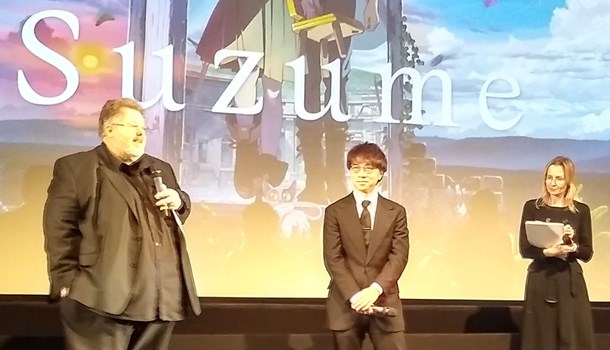
Written by Richard Durrance on 03 Mar 2023
As the last film and director Q&A I saw at the BFI Southbank having been 20-some-years previous (when it was still known as the National Film Theatre), what better an opportunity than kick back and spend two hours with Makoto Shinkai’s latest film Suzume, then another hour with the man himself.
Stepping in front of the screen to say a short welcome before the film, I felt immediately that Shinkai was not going to fall into the category that so many do, directors who might make excellent films but cannot talk meaningfully about them. Speaking briefly in English, having lived in London twenty years before, but preferring understandably to mainly speak Japanese to allow himself to most fully express himself, there was a lovely connection between Shinkai and his interviewer (it's clear they've been friends for years) but plaudits must go to his interpreter too, as she was able to express Shinkai’s words not just as language, but with the humour and humanity you could feel that sat behind his responses. It was a small but classic leaving-you-wanting-more intro. 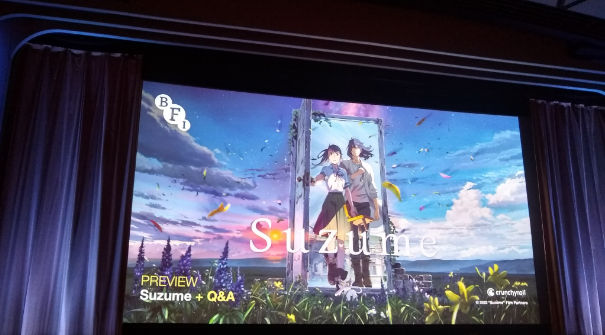
Suzume is a film that shares the narrative clarity of Your Name, as well as showing itself a master of quietly planting narrative strands that pay off later. These unfold naturally throughout the film, the payoff for each having a pleasant little pop.
It's an intriguing film because it is taking a difficult route, aiming to tell a story about a very serious subject clearly close to Shinkai’s heart, but doing so gently and with a great deal of humour. It didn’t need the interviewer at the later Q&A to call out the influence of Hayao Miyazaki and Studio Ghilbi on the film, it is so apparent – I say apparent but it is not lazy nor is it attempting to "be" Miyazaki (though as Shinkai spoke about, for all he has been trying to distance himself from being the "next Miyazaki", he is also Shinkai’s favourite director and there are easter eggs in Suzume relating to Miyazaki’s work), instead there is that deft lightness of touch that allows Shinkai to balance the dramatic with the much more overtly humourous aspects that feels very much like Miyazaki at his best.
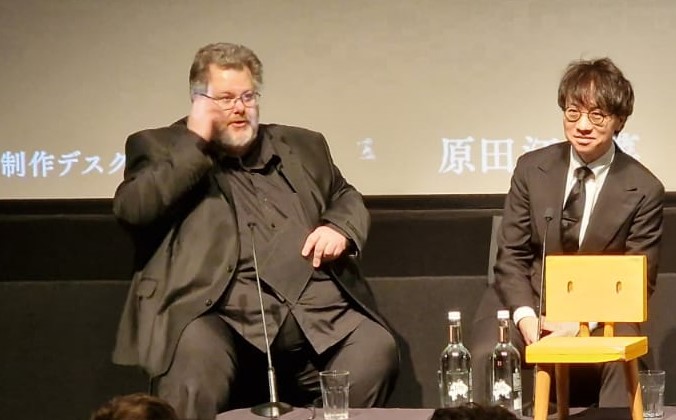
What underpins Suzume’s story, and often that of the titular character’s own picaresque journey, is its exploration of places that have been abandoned (hiakyo, or to translate, ruins); places lost whether through diminishing population or more often by disasters. It’s no surprise that a lorry, seen for just a moment, is carrying “toxic sand”. As Suzume and Souta move across Japan from abandoned place to desolate area, echoes of natural disasters are everywhere. Mobile phones frequently buzz with government alerts. It’s everyday but it’s also disturbing: the pavement shakes, there is fear, but it is also accepted as the norm; a moment of peace broken by what might be an awful catastrophe or just another scare.
But Suzume sees something else behind these quakes, primordial forces under the earth that need to be subjugated or else they will cause wider destruction. Shinkai is externalising the impact of the recent natural and unnatural disasters that have happened in Japan, making of them a fantastical creature very much in the way that Godzilla did for the post-war nuclear age. The director finds a way to acknowledge the impact of these disasters through his film and in doing so does two things simoultanously: turn the film into a rollicking adventure and also a very personal drama. Shinkai spoke at length as to the deeply serious aspects behind why he made Suzume, but also how he understood that in order to convey these, he had to ensure the film remained entertaining and humorous. In this, Shinkai succeeds, in part because he nails the type of humour that Miyazaki does so well. Earlier in the year as part of the BFI’s 100 greatest films I watched Spirited Away on the same screen (almost the same seat in fact). I’d not seen the Oscar-winning film at the cinema since its release and what could in other hands be cutesy, the dust creatures, in Miyazaki’s hands become infinitely charming and Shinkai manages that with his chair-character - being three-legged he must skitter along absurdly yet the rationale for what the chair is skittering after matters - it is genuinely life and death, so the humour underscores the seriousness but makes us smile, laugh and even an old cynic like me finds it charming. Oh, yes, Shinkai is no fool, he walked into the Q&A after with a replica of the chair. He knows how to entertain an audience, to win them over with the smallest of things. More so for making no mention of it.
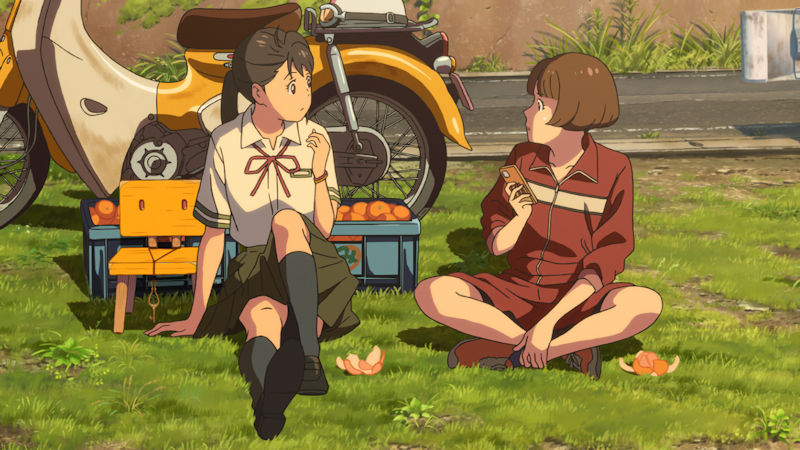
If you can throw anything at the film it is perhaps that its narrative structure is naturally a little bit wandering because Suzume's journey across Japan is just that. But again, this is important because she meets and forges relationships as she goes along, mainly with women, who as Shinkai pointed out, are like Suzume and her aunt; somewhat marginalised. A fellow teenager who works at a hotel or the mother who has to work in a bar to make ends meet, yet always there is a sense of community and warmth. But there are also darker emotions under the surface which are revealed later in an angry exchange, but as the director rightly notes, such exchanges only focus on the moment and don't allow for the myriad of concurrent thoughts and feelings that exist within every relationship. Anger sometimes outpaces love, and in this we are all very human. Shinkai noted he has often felt that way about his own daughter, but it's a flash against the consistent love and care that pervade the relationship.
Yet let us return to the lightness of the film, because as much as it has the more charming humour that suffuses and softens the film it is also unafraid to introduce moments where you can see the punchlines coming from a mile away but these are handled deftly; Shinkai realises if you handle it just right there is joy in knowing they are coming, and this is something he slips in so effortlessly that it’d take the worst kind of grump to begrudge him these comedic aspects.
Yet ultimately Suzume is a film about humans surviving disasters, the joy that life can still bring, and the scars that they leave on us that we live learn to with. It's interesting that Suzume will be released about a year after last year’s big release, Belle and I have to say Belle doesn’t touch the sides of Suzume, which has a delicacy of emotion and a commitment to it that the more I reflect on Belle I feel that film lacks. 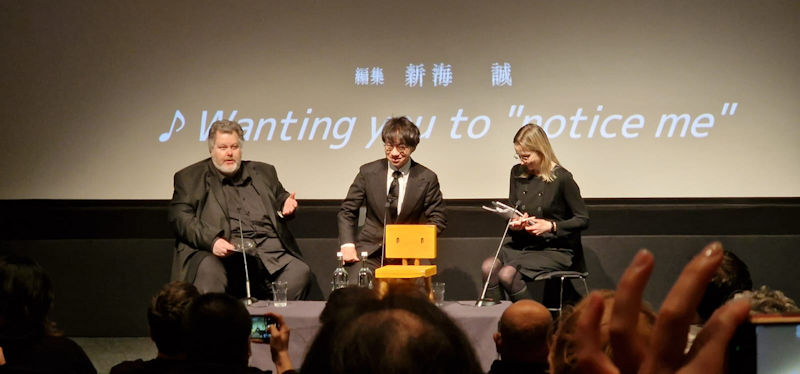
To maximise the time of Q&A the sound dimmed and credits still running, out they came for the Q&A...
During the Q&A, I felt like Shinkai had really turned up as himself: no front, no pre-scripted jokes and no ham-fisted attempts to describe his art. That said some kudos must go to the interviewer because instead of starting with some long-winded question as some do he allowed the director to start with a statement, perhaps Shinkai’s longest throughout the whole Q&A, which delved into the history of the film, the importance of the tsunami, Fukushima, and how these had been key in developing the story. You could tell how much, even though spoken of gently and with humour, it mattered to tell the story of Suzume’s development, and in elucidating Suzume’s origins, as well as about all his films, how much it mattered to him that his films spoke to a Japanese audience first, despite his naturally occurring global success – something I remember Akira Kurosawa noting in relation to his work: the approbation of the world was never the intention.
In response to a direct question, yes, occasionally Shinkai had to suffer the producer's edit of an idea or two, but foremost the home audience was what he had in mind and not a global one, not trying to make a film that could be a sensation around the world (I should add that if I saw he suffered the producer’s intervention there was no rancour here and spoken with a twinkle, especially when told what it was – and let’s just say some things don’t always translate too well). As Shinkai unravelled his intention behind Suzume, he was clear in how he felt it was also absolutely vital the film should work as a piece of entertainment, not just to sugar the bitter pill but necessary to recognise that disasters may leave a mark but they do not wholly define us nor the Japanese people. Shinkai summed it up best in how the yellow chair came about and it's role in conveying dual symbolism; it represents the how we can be marked, in this case by the loss of Suzume’s mother, her home and the damage to her heart; but also how despite the harm done to us, for however out of balance we are (like the chair itself) we are able to - and must - skittle along on our three remaining legs. Again, the balance of the serious and charmingly amusing.
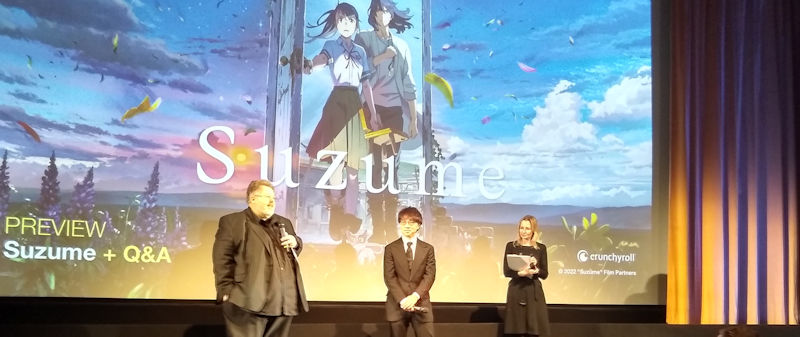 Shinkai's introduction
Shinkai's introduction
Though how the film never loses its focus on its home audience does mean that some aspects of it though very personal to him will only be most apparent to a home audience. Suzume and Tamaki being driven by a friend of Souta’s across Japan, they listen to songs, songs Shinkai described both reflecting aspects of his influences but also ones that would also be singalong tunes that people would recognise and likely remember while taking similar journeys because the world of Suzume for that all it might seem a fictional space, for all the fantastical elements that his film is naturally imbued with, it is nevertheless meant to be the real, absolute world of Japan. His desire was that the audience should recognise this, one suspects in part to deepen their connection to what they see on screen.
What is key here is how these aspects never effect the impact of the film. Rather these are elements that if you the perspicacity or cultural knowledge to recognise them then they will likely make the film richer but missing them means you miss nothing because on a different level we recognise what is going on: a car, a specific set of sounds, music, that can in some way be considered iconic and of course audiences are no fools, we fill in the blanks with our own imagination, Shinkai simply gives us a layered potential of understanding: a specific cultural relevance that if we don’t entirely recognise we nevertheless fill ourselves, just as I can imagine similarly being driven through the south of France as a young child listening to Roxy Music’s Avalon... it doesn’t matter what the songs are we connect to it, and if not songs then something else, we will fill it with our own emotions and come to the same place that Shinkai wants us to be.
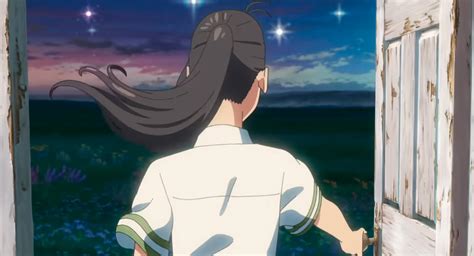
Connections to a character’s emotions were also something that came out as the director described how a sudden outburst from Suzume’s aunt equated to his own frustrations at times with being a parent and like Tamaki, Shinkai recognised how the emotion is fleeting, and in keeping with his whole presentation even when speaking of frustrations there was always a sly humour that underlined his statement; moving suddenly to English to say “it was very annoying” after speaking about how his daughter during lockdown would ask if his film was ready yet. Every. Day.
And of course this connects us to him, like us he has lived and worked at home during covid; this itself was perhaps another influence, how the presence of his daughter might be another reason why Suzume contains so much overt humour. I suspect many like me at the Q&A would struggle to say just how much humour Shinkai displayed, honest, normal, human humour such that I have to say I think I may well have enjoyed the Q&A as much if not more than the film. Credit here also goes to the translator who showed genuine artistry in how she was able to interpret and relay Shinkai’s tone. She had the same sparkle of eye and slyness of tongue that Shinkai could, while also relaying the more serious and heartfelt messages Shinkai wanted to get across.
It’s possible the Q&A might see the light of day as extra material on a blu-ray and I hope it does as it restored my hope and faith that directors can talk meaningfully about their films, as Shinkai did. Moreover, you felt you glimpsed a little of the man himself.
And if anyone is wondering, as his daughter was around his office as Shinkai worked with his virtual team on Suzume, if she liked the film? Let’s say that when she was taken to see it she wanted to watch it again, but is was nearly 9pm and children that young are not allowed in cinemas in Japan after 9pm.
Our official review will be posted nearer the film's launch, but for now, know that you can book your ticket with justified anticipation.
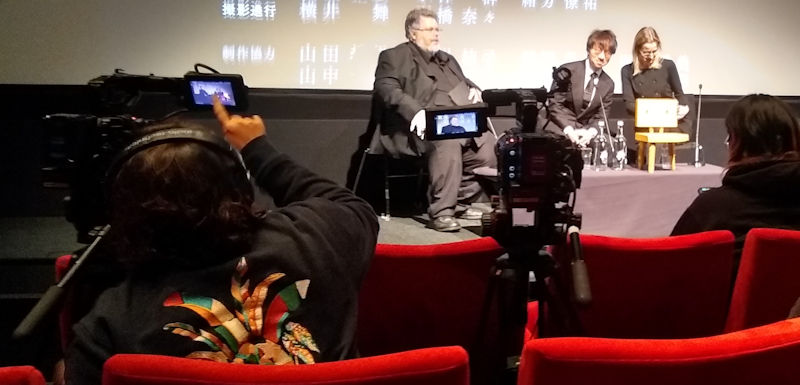
My first hand view of the man with the all important filming duties

Long-time anime dilettante and general lover of cinema. Obsessive re-watcher of 'stuff'. Has issues with dubs. Will go off on tangents about other things that no one else cares about but is sadly passionate about. (Also, parentheses come as standard.) Looks curiously like Jo Shishido, hamster cheeks and all.
posted by on 19 Dec 2025
posted by Ross Liversidge on 27 Nov 2025
posted by Ross Liversidge on 21 Nov 2025
posted by Ross Liversidge on 16 Oct 2025
posted by Ross Liversidge on 14 Oct 2025
posted by Ross Liversidge on 10 Oct 2025
posted by Ross Liversidge on 30 Sep 2025